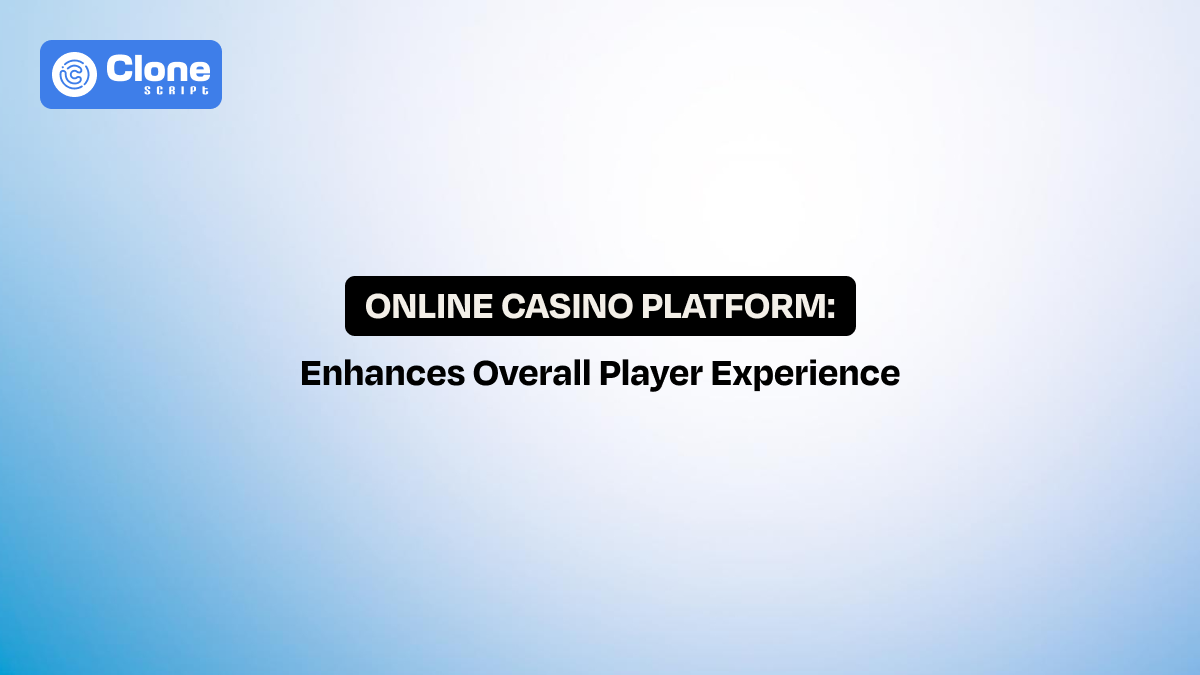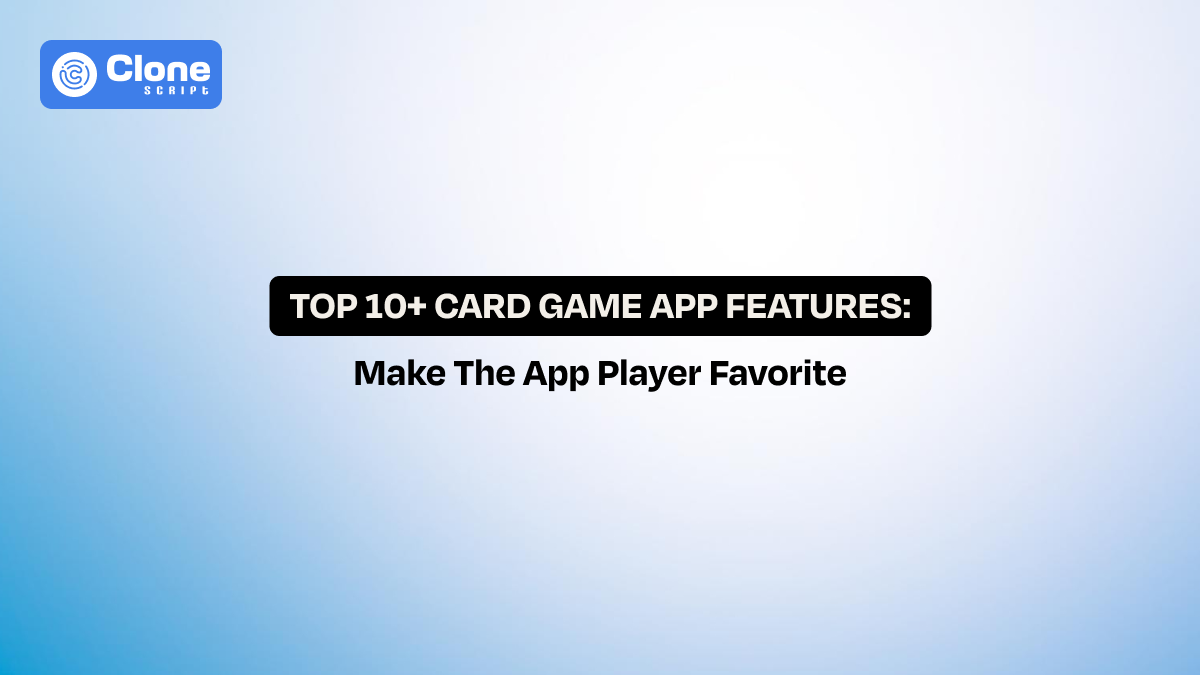How to Enhance Player Experience on Your Online Casino Platform
In the $95 billion online gambling market projected for 2025, competition is much more intense, and differentiation is razor-thin. What ultimately determines success isn’t just the volume of games available but how well the platform treats its players.
Now, players no longer tolerate stuck interfaces or slow-loading slots. In casino gaming website development, everything has to be on point, from elite gameplay, engaging design, personalized rewards, and secure payments. Platforms that master this balance enjoy higher retention rates.
This is where casino UX design becomes the growth driver. Every button placement, reward mechanism, or transaction speed plays a role in shaping loyalty.
In this article, we will guide you on how to design the gambling website to acquire and retain them through factual tactics.
Key Insights of Online Casinos
-
60% of players switch casinos due to poor usability or trust issues (Statista).
-
A 30% churn rate has been found in the first week of a newly joined casino player.
-
70% of users drop off if the signup process feels too long or complex.
-
Personalization can lift revenues by up to 30%. (McKinsey reports)
-
50% more players are likely to stay on a platform if consistently rewarded.
-
Gambling platforms with gamified elements see 60% higher engagement.
-
Nearly 37% of players abandon platforms with poor payment options.
-
Google reports 53% of mobile users abandon sites that take over three seconds to load.
Top 10 Tips to Deliver a Seamless Online Casino Gaming Experience
Follow these tips for improving your platform gaming experience on the top level:
1. Simplify Navigation and Onboarding UX Indicate Professionalism.
First impressions matter. If new players land on your casino website and immediately face a confusing layout, endless forms, or unclear CTAs, they’re gone. A clear path always works better.
-
For example, from the landing page to first play and deposit, intuitive and effortless navigation delivers a better user experience. It considers the best feature of a casino website.
Keep in mind, players don’t want to “figure out” how to start. They want to join it without wasting a second.
Why it matters:
Clean navigation and frustration-free onboarding directly impact conversions. By making the journey simple, predictable, and fast, you increase demo-to-deposit conversions and create a smoother casino user experience from day one.
How to implement it:
-
Keep sign-up short: start with just email plus password, and push KYC to later.
-
Offer social logins or passwordless WebAuthn to cut processing time.
-
Use smart search and filters (by game type, provider, volatility).
-
Add inline help, tooltips, or quick tutorials so players don’t get lost.
-
Build your signup API to handle staged payloads, making KYC asynchronous.
KPIs to track:
-
Signup-to-deposit conversion rate.
-
Drop-offs during onboarding.
-
Time-to-first-play.
-
Percentage of users completing KYC within 24 hours.
2. Personalization on the Platform Wins Trust of Players.
No player wants to feel like just another number in a gambling platform. Personalization turns an ordinary casino website into a tailored experience. By recommending the right games, showing relevant promotions, and offering localized currencies, you make each visit feel unique.
Why it matters:
Personalized platforms drive deeper engagement. For casinos, this means longer sessions, higher deposits, and repeat visits.
How to implement:
-
Use AI to recommend games based on past behavior.
-
Customize offers (e.g., free blackjack spins for blackjack lovers).
-
Localize dashboards with language and currency options.
-
Send reminders or promotions when users go inactive.
-
Highlight achievements tied to personal play habits.
KPIs to track:
-
CTR on personalized game suggestions.
-
Offer redemption rates.
-
Average session length.
-
Retention of personalized vs. non-personalized users.
3. Demo Modes Always Bring New Users to Online Casino.
The psychology of the casino players is that they want to check the platform functionality without depositing money. Here, a demo mode playing experience works as a magnet to catch those users' attention.
In other words, players often hesitate to deposit before they’ve tested a game. Demo modes let users play risk-free and build confidence. For newcomers, it’s a way to explore without fear. For veterans, it’s a chance to try new titles.
Why it matters:
Demo play builds trust and drives conversion. Users who try demos are far more likely to move into real-money play. It’s one of the most useful features for online casino platforms because it removes the “fear of the unknown.”
How to implement:
-
Offer demo versions of popular slots, tables, and live games.
-
Keep demo wallets separate from real-money accounts.
-
Add a one-click option to “switch to real play.”
-
Highlight jackpots, bonus rounds, or big-win moments in demo mode.
-
Encourage progression by rewarding players who shift from demo to deposit.
KPIs to track:
-
Demo-to-deposit conversion rate.
-
Average demo playtime.
-
Percentage of users engaging with demos before depositing.
4. Rewards Transparency: Keep Credibility Maintained.
Rewards keep players engaged long after the novelty wears off. Bonuses, loyalty points, and VIP programs transform gameplay into an ongoing journey rather than just isolated bets. A well-designed rewards system can motivate consistent play, enhance retention, and increase the likelihood of higher spending.
Why it matters:
Casino reward structures significantly boost loyalty. Moreover, rewards encourage more frequent deposits and longer session times. They also provide psychological reinforcement—players feel recognized for their efforts to strengthen emotional attachment to the platform.
How to implement:
-
Add streak-based daily login bonuses to encourage habitual engagement.
-
Build tiered VIP systems with exclusive perks, like private tournaments or cashback bonuses.
-
Offer rewards tied to preferred games to increase time spent on high-margin titles.
-
Show progress bars or reward dashboards to give players a visual sense of achievement.
-
Celebrate milestones with instant feedback (confetti, sound effects, animations).
-
Introduce surprise or seasonal rewards to maintain excitement.
KPIs to track:
-
Reward redemption rate, showing how appealing and reachable your rewards are.
-
Daily and weekly login activity to measure ongoing engagement.
-
Average player lifetime value (LTV) often increases with effective rewards.
-
Churn rate among rewarded vs. non-rewarded players to quantify loyalty impact.
5. Gamification Drive Engagement and Competition.
Gamification transforms gambling into an adventure. Features like leaderboards, quests, and achievements motivate players to chase progress and recognition rather than purely monetary gains. By creating a sense of purpose and progression, casino platforms turn ordinary gameplay into a compelling journey.
Why it matters:
Gamification introduces goals beyond monetary rewards, helping players feel invested in their progress. It encourages social interaction, healthy competition, and personal achievement, contributing to longer retention. These kinds of experiences are especially effective for casual players who may otherwise lose interest quickly.
How to implement:
-
Introduce seasonal quests or missions with clear objectives.
-
Add badges or titles for milestones (e.g., “100 hands of blackjack” or “First Mega Win”).
-
Create real-time leaderboards to encourage competition.
-
Use progression bars to visually show progress toward goals.
-
Offer community-driven challenges for social play and collaboration.
-
Implement achievement tiers that unlock new content or rewards.
KPIs to track:
-
Participation rates in quests, events, or seasonal challenges.
-
Leaderboard activity and engagement metrics.
-
Average engagement per player session.
-
Return visits are tied to gamified features and reward milestones.
6. Payment and Security Enhancements: Feels Motivated.
Payments are where trust is won or lost. Casino players expect instant deposits, fast withdrawals, and advanced security. Any vulnerability at this stage can directly lead to churn. Security is equally important, and players must feel confident that their money and personal information are safe.
Why it matters:
Efficient, secure transactions not only reduce frustration but also build long-term loyalty. Strong security practices demonstrate professionalism and compliance, which reassure players and improve brand reputation.
How to implement:
-
Support multiple payment methods (cards, e-wallets, cryptocurrencies). For that, payment gateway integration setup and testing are required before it is used by players.
-
Check the withdrawal process is instant or near-instantly to meet player expectations.
-
Implement SSL encryption, fraud detection, and regular security audits.
-
Offer biometric authentication for mobile apps for added security.
-
Stay compliant with PCI-DSS, GDPR, and other relevant regulations.
-
Regularly update fraud detection and anti-money laundering systems.
KPIs to track:
-
Deposit success rate and failed transaction frequency.
-
Average withdrawal processing time.
-
Fraud detection rate and number of blocked fraudulent transactions.
-
Number of customer support tickets related to payments.
7. Engaging Design and Interactive Features Maintain UX.
Website UI/UX design isn’t just aesthetics. It directly impacts the casino user experience. Visuals, animations, and interactive elements drive excitement and immersion. Conversely, cluttered or outdated designs frustrate players and reduce engagement.
Why it matters:
A well-designed interface boosts user satisfaction and retention. Responsive, accessible design checks that every player can engage seamlessly across devices, from desktops to mobile. While interactive features on a casino website enhance immersion, they turn routine gameplay into a memorable experience. Additionally, personalization options further strengthen emotional connection.
How to implement:
-
Use crisp, high-quality visuals with lightweight, optimized animations.
-
Add celebratory effects for big wins or milestones.
-
Integrate live chat in multiplayer and live dealer games to increase social engagement.
-
Allow avatars, custom skins, or themes for personalization.
-
Include accessibility features like adjustable font sizes, color contrast, and screen reader support.
-
Test UX elements continuously for mobile and desktop responsiveness.
KPIs to track:
-
Average session duration per player.
-
Bounce rates segmented by device type.
-
Adoption rates of interactive features (avatars, themes).
-
Accessibility feature usage metrics.
8. Speed Optimization Convince Players to Come Back.
Website speed optimization is an important factor in an online casino platform. Slow-loading websites frustrate users and drive them away. Performance issues can undermine even the best design and gameplay.
Why it matters:
In live games, lag equates to lost trust, missed bets, and lower engagement. Fast-loading casino games maintain momentum, improve user satisfaction, and reduce churn.
How to implement:
-
Optimize assets using compression and lazy loading for images and media.
-
Deploy a Content Delivery Network (CDN) for global reach and faster delivery.
-
Implement mobile-first, responsive frameworks to maintain a seamless experience.
-
Prioritize metrics like Time to Interactive (TTI) and Interaction to Next Paint (INP).
-
Use WebSockets or similar technologies for real-time updates in multiplayer and live dealer games.
-
Regularly test latency across devices and regions to preempt performance bottlenecks.
KPIs to track:
-
Page load time across desktop and mobile.
-
First Contentful Paint (FCP) and Time to Interactive (TTI).
-
Game latency in live multiplayer or streaming games.
-
Abandonment rate linked to performance delays.
9. Trust Signals Are Useful to Make Privacy Top-notch.
Trust is the key element of online casinos. Players deposit and engage only when confident that the platform is secure, fair, and reliable. A strong reputation backed by visible proof of compliance, fairness, and security encourages players to not only try the platform but also continue playing over the long term.
You can use trust signals in your casino marketing strategies.
Why it matters:
Credibility signals significantly reduce hesitation and increase conversion rates, especially for first-time visitors. In a market, scams are common; transparent operations, social proof, and compliance cues differentiate legitimate platforms. Demonstrating fairness and security builds long-term retention, improves brand perception, and encourages word-of-mouth referrals.
How to implement:
-
Display licensing and regulatory compliance badges prominently on the homepage and deposit pages.
-
Publish RNG (Random Number Generator) audit reports, payout percentages, and other fairness certifications.
-
Show SSL certificates, GDPR compliance icons, and up-to-date cybersecurity assurances.
-
Highlight genuine player testimonials, verified reviews, and community endorsements.
-
Add real-time win feeds or social proof to showcase active player success and transparency.
-
Communicate responsible gaming practices clearly, including self-exclusion and deposit limit tools.
-
Regularly update trust-related content to reflect new certifications or achievements, signaling ongoing commitment to security and fairness.
KPIs to track:
-
Conversion rate on first deposits and registrations.
-
Bounce rate from key pages like deposits, account creation, or game access.
-
Player trust survey scores and qualitative feedback.
-
Percentage of new users citing “trust” as a primary reason for joining.
-
Frequency of repeat deposits and engagement from verified, trusted users.
10. Customer Support Work as a Best Factor.
Even with flawless design and engaging features, players will encounter issues. Efficient, empathetic support can turn potential frustration into loyalty, creating a positive experience even when problems arise. High-quality support is a direct reflection of platform reliability and professionalism.
Why it matters:
Fast, helpful, and reliable support prevents small issues from escalating into churn. Proactive and well-structured support reinforces trust and enhances lifetime value. Platforms that fail in support risk negative reviews, social media complaints, and a damaged reputation. These factors that deter new users. Excellent support can become a competitive differentiator in a crowded casino market.
How to implement:
-
Provide 24/7 multilingual support through live chat, email, and phone to accommodate global players.
-
Use AI-driven chatbots to handle FAQs while escalating complex issues to human agents seamlessly.
-
Embed contextual support tools so agents see a player’s session data, recent deposits, or game activity instantly.
-
Implement robust ticketing systems with real-time status updates, prioritization, and tracking.
-
Proactively reach out after failed deposits, long wait times, or repeated login errors to prevent frustration.
-
Train agents to be professional, solution-oriented, and capable of cross-selling promotions when appropriate.
-
Maintain knowledge bases, guides, and tutorial content to reduce repetitive support queries and help players to self-solve minor issues.
KPIs to track:
-
First Response Time (FRT) for all queries across channels.
-
Customer Satisfaction Score (CSAT) after ticket resolution.
-
Average resolution time per ticket and escalation rate.
-
Reduction in churn is directly linked to support engagement.
-
Number of repeat support requests for the same issue, indicating resolution quality.
Conclusion
Building a successful online casino is more than offering games—it’s about creating a complete experience for players. Rewards, gamification, fast payments, strong security, and helpful customer support all play a role in keeping players engaged. Good design, quick loading, and clear trust signals make the platform more reliable and enjoyable. By tracking key metrics and improving features based on player behavior, casinos can keep effort players stay longer and return often. A casino that combines fun, safety, and ease of use will not only attract players but also build lasting loyalty.
FAQs
-
How can responsible gaming practices impact player loyalty?
Implementing responsible gaming measures demonstrates a commitment to player well-being, which can encourage trust and long-term engagement in the casino website.
-
What are the benefits of offering multiple payment options?
Providing various payment methods on the casino website, including cryptocurrencies and e-wallets, accommodates global players and enhances convenience. This aspect overall promotes trust and retention.
-
How does data analytics contribute to player retention?
Analyzing player behavior allows casinos to identify trends, personalize experiences, and proactively address issues. These insights lead to improved retention and help in marketing strategy planning.
-
Why is mobile optimization important for online casinos?
To retain the existing users and onboard new ones, especially those who prefer an instant gaming experience, a mobile optimization is required for online casino websites. Also, with a larger number of players accessing casinos via mobile devices, a responsive site is essential.
-
How can gamification improve player engagement in online casinos?
Gamification introduces elements like missions, achievements, and leaderboards to make the gaming experience more interactive and rewarding. This can significantly boost player retention.
 BTC - Bitcoin
BTC - Bitcoin
 USDTERC20 - USDT ERC20
USDTERC20 - USDT ERC20
 ETH - Ethereum
ETH - Ethereum
 BNB - Binance
BNB - Binance
 BCH - Bitcoin Cash
BCH - Bitcoin Cash
 DOGE - Dogecoin
DOGE - Dogecoin
 TRX - TRON
TRX - TRON
 USDTTRC20 - USD TRC20
USDTTRC20 - USD TRC20
 LTC - LiteCoin
LTC - LiteCoin







